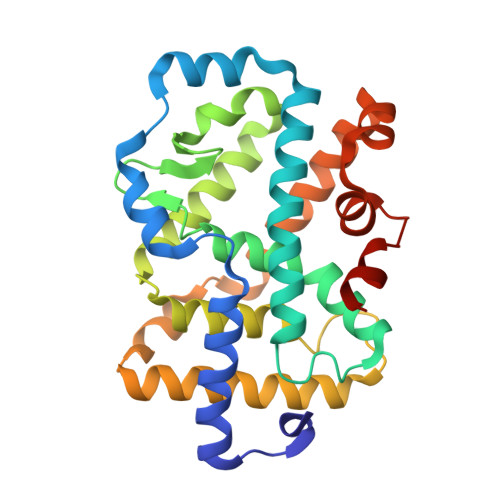Discovery, structural optimization, and anti-tumor bioactivity evaluations of betulinic acid derivatives as a new type of ROR gamma antagonists.
Mei, L., Xu, L., Wu, S., Wang, Y., Xu, C., Wang, L., Zhang, X., Yu, C., Jiang, H., Zhang, X., Bai, F., Xie, C.(2023) Eur J Med Chem 257: 115472-115472
- PubMed: 37236000
- DOI: https://doi.org/10.1016/j.ejmech.2023.115472
- Primary Citation of Related Structures:
8GXP - PubMed Abstract:
Betulinic acid (BA) is a natural pentacyclic triterpenoid that has a wide range of biological and pharmacological effects. Here, computational methods such as pharmacophore screening and reverse docking were used to predict the potential target for BA. Retinoic acid receptor-related orphan receptor gamma (RORγ) was confirmed as its target by several molecular assays as well as crystal complex structure determination. RORγ has been the focus of metabolic regulation, but its potential role in cancer treatment has only recently come to the fore. In this study, rationale optimization of BA was performed and several new derivatives were generated. Among them, the compound 22 showed stronger binding affinity with RORγ (K D = 180 nM), good anti-proliferative activity against cancer cell lines, and potent anti-tumor efficacy with a TGI value of 71.6% (at a dose of 15 mg/kg) in the HPAF-II pancreatic cancer xenograft model. Further RNA-seq analysis and cellular validation experiments supported that RORγ antagonism was closely related to the antitumor activity of BA and 22, resulting in suppression of the RAS/MAPK and AKT/mTORC1 pathway and inducing caspase-dependent apoptosis in pancreatic cancer cells. RORγ was highly expressed in cancer cells and tissues and positively correlated with the poor prognosis of cancer patients. These results suggest that BA derivatives are potential RORγ antagonists worthy of further exploration.
Organizational Affiliation:
School of Chinese Materia Medica, Nanjing University of Chinese Medicine, Nanjing, 210023, China; Drug Discovery and Development Center, Shanghai Institute of Materia Medica, Chinese Academy of Sciences, 555 Zuchongzhi Road, Shanghai, 201203, China.















